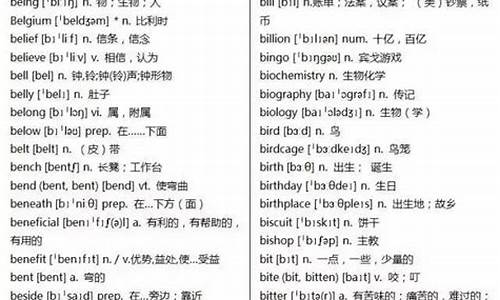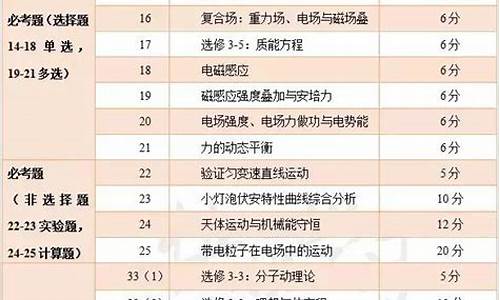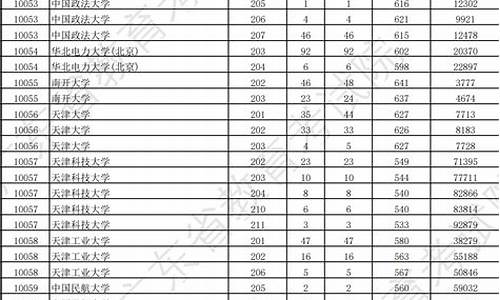您现在的位置是: 首页 > 教育分析 教育分析
高考名词搭配,高考名词的用法
tamoadmin 2024-06-13 人已围观
简介1.高考英语引导名词性从句辨析2.高考日语常见语法解析说明(一)3.高考英语词组4.高考英语语法必考点与常考点归纳(背诵版)5.高考英语中关于抽象名词和名词的用法具体分析,悬赏30分6.exercise语法搭配 和用法7.高考英语名词考点例题解析?在句子中起名词作用的句子叫名词从句 (Noun Clauses)。 名词从句的功能相当于名词词组, 它在复合句中能担任主语、宾语、表语、同位语、介词宾语
1.高考英语引导名词性从句辨析
2.高考日语常见语法解析说明(一)
3.高考英语词组
4.高考英语语法必考点与常考点归纳(背诵版)
5.高考英语中关于抽象名词和名词的用法具体分析,悬赏30分
6.exercise语法搭配 和用法
7.高考英语名词考点例题解析?

在句子中起名词作用的句子叫名词从句 (Noun Clauses)。 名词从句的功能相当于名词词组, 它在复合句中能担任主语、宾语、表语、同位语、介词宾语等,因此根据它在句中不同的语法功能,名词从句又可分别称为主语从句、宾语从句、表语从句和同位语从句。
一、高考焦点指南在复合句中起名词作用的从句叫做名词性从句。它包括主语从句、宾语从句、表语从句和同位语从句。名词性从句是中学阶段的一个重要语法项目,在历年的高考中几乎都涉及到,并且每年的命题各有变化。分析历届高考试题名词性从句考查的焦点主要有以下六个方面
1. 考查名词性从句的语序问题
高考真题例示:
例1. The photographs will show you ____.(MET1989)
A. what does our village look like B. what our village looks like
C. how does our village look like D. how our village looks like
例2. Someone is ringing the doorbell. Go and see ___________. (NMET2000)
A. who is he B. who he is C. who is it D. who it is
例3. Can you make sure ______ the gold ring? (NMET1990)
A. where Alice had put B. where did Alice put
C. where Alice has put D. where has Alice put
例4. He asked ________ for the violin. (NMET1991)
A. did I pay how much B. I paid how much
C. how much did I pay D. how much I paid
2. 考查引导词that与what的区别
高考真题例示:
例1. ______we can’t get seems better than ______we have. (NMET1996)
A. What; what B. What; that C. That; that D. That; what
例2. No one can be sure _____ in a million years. (MET1991)
A. what man will look like B. what will man look like
C. man will look like what D. what look will man like
例3. _______ you have done might do harm to other people. (MET 1987)
A. That B. What C. Whether D. How
例4. _______ you don't like him is none of my business. (上海1992)
A. What B. Who C. That D. Whether
3. 考查it在名词性从句中作形式主语或形式宾语的用法
高考真题例示:
例1. _____ is a fact that English is being accepted as an international language. (NMET1995)
A. There B. This C. That D. It
例2. It worried her a bit ______her hair was turning grey.
A. while B. if C. that D. for
例3. I hate _____when people talk with their mouths full. (NMET1998)
A. it B. that C. this D. them
例4. Does _______ matter if he can't finish the job on time? (MET 1991)
A. this B. that C. he D. it
4. 考查whether与if的区别
高考真题例示:
例1. _____we’ll go camping tomorrow depends on the weather. (NMET1996)
A. If B. Whether C. That D. Where
例2. What the doctors really doubt is _____my mother will recover from the serious disease soon. (上海2001)
A. when B. how C. whether D. why
例3. _____ the 2000 Olympic Games will be held in Beijing is not known yet. (MET1992)
A. Whenever B. If C. Whether D. That
5. 考查名词性从句中的疑问词+ever引导的名词性从句与no matter+疑问词引导的状语从句的区别
高考真题例示:
例1. It is generally considered unwise to give a child _____he or she wants. (NMET1997)
A. however B. whatever C. whichever D. whenever
例2. ______leaves the room last ought to turn off the lights. (MET1988)
A. Anyone B. The person C. Whoever D. Who
例3. Sarah hopes to become a friend of ______shares her interests. (上海1995)
A. anyone B. whomever C. whoever D. no matter who
6. 考查名词性从句的虚拟语气问题
高考真题例示:
例1:It is necessary that a college student ______at least a foreign language. (上海1993)
A. masters B. should master C. mastered D. will master
二、语法要点剖析
一、名词性从句
主语从句、表语从句、宾语从句、同位语从句,在整个句子中所起的作用,相当于一个名词。因此,这四种从句通称为名词性从句。
引导名词性从句的连接词可分为三类:
连接词:that, whether, if (不充当从句的任何成分)
连接代词:what, whatever, who, whoever, whom, whose, which.
连接副词:when, where, how, why
1. 主语从句
作句子主语的从句叫主语从句。主语从句通常由从属连词that,whether,if和连接代词what,who,which,whatever, whoever以及连接副词how,when,where,why等词引导。that在句中无词义,只起连接作用;连接代词和连接副词在句中既保留自己的疑问含义、又起连接作用,在从句中充当从句的成分。例如:
What he wants to tell us is not clear. 他要跟我们说什么,还不清楚。
Who will win the match is still unknown. 谁能赢得这场比赛还不得而知。
It is known to us how he became a writer. 我们都知道他是如何成为一名作家的。
Where the English evening will be held has not yet been announced. 英语晚会将在哪里举行,还没有宣布。
有时为避免句子头重脚轻,常用形式主语it代替主语从句作形式主语放于句首,而把主语从句置于句末。主语从句后的谓语动词一般用单数形式。常用句型如下:
(1)?It + be + 名词 + that从句
(2)It + be + 形容词 + that从句
(3)It + be + 动词的过去分词 + that从句
(4)It + 不及物动词 + that 从句
另注意在主语从句中用来表示惊奇、不相信、惋惜、理应如此等语气时,谓语动词要用虚拟语气“(should) +do”,常用的句型有:
It is necessary (important, natural, strange, etc.) that …
It is a pity (a shame, no wonder, etc.) that…
It is suggested (requested, proposed, desired, etc.) that…
2. 宾语从句
名词句用作宾语的从句叫宾语从句。引导宾语从句的关联词与引导主语从句表语从句的关联词大致一样,在句中可以作谓语动词或介词及非谓语动词的宾语。
1. 由连接词that引导的宾语从句
由连接词that引导宾语从句时,that在句中不担任任何成分,在口语或非正式的文体中常被省去,但如从句是并列句时,第二个分句前的that不可省。例如:
He has told me that he will go to Shanghai tomorrow. 他已经告诉我他明天要去上海。
We must never think (that) we are good in everything while others are good in nothing. 我们决不能认为自己什么都好,别人什么都不好。
注意:在demand、order、suggest、decide、insist, desire, demand, request, command等表示要求、命令、建议、决定等意义的动词后,宾语从句常用“(should)+ 动词原形”。例如:
I insist that she (should) do her work alone. 我坚持要她自己工作。
The commander ordered that troops (should) set off at once. 司令员命令部队马上出发。
2. 用who,whom, which, whose, what, when, where, why, how, whoever, whatever, whichever等关联词引导的宾语从句相当于特殊疑问句,应注意句子语序要用陈述语序。例如:
I want to know what he has told you. 我想知道他告诉了你什么。
She always thinks of how she can work well. 她总是在想怎样能把工作做好。
She will give whoever needs help a warm support. 凡需要帮助的人,她都会给予热情的支持。
3. 用whether或if引导的宾语从句,其主语和谓语的顺序也不能颠倒,仍保持陈述句语序。此外,whether与if 在作“是否”的意思讲时在下列情况下一般只能用whether,不用if:
a. 引导主语从句并在句首时;b. 引导表语从句时;c . 引导从句作介词宾语时;d. 从句后有“or not”时;e. 后接动词不定式时。例如:
Whether there is life on the moon is an interesting question. 月球上有没有生命是个有趣的问题。
The question is whether she should have a low opinion of the test?
Everything depends on whether we have enough money. 一切要看我们是否有足够的钱。
I wonder whether he will come or not. 我想知道他来还是不来。
Can you tell me whether to go or to stay? 你能否告诉我是去还是留?
4. 注意宾语从句中的时态呼应,当主句动词是现在时,从句根据自身的句子情况,而使用
不同时态。例如:
he studies English every day. (从句用一般现在时)
he studied English last term. (从句用一般过去时)
I know (that) he will study English next year. (从句用一般将来时)
he has studied English since 1998. (从句用现在完成时)
当主句动词是过去时态(could, would除外),从句则要用相应的过去时态,如一般过去时,过去进行时,过去将来时等;当从句表示的是客观真理,科学原理,自然现象,则从句仍用现在时态。例如:
The teacher told us that Tom had left us for America.
5. think, believe, imagine, suppose等等动词引起的否定性宾语从句中,要把上述主句中的动词变为否定式。即将从句中的否定形式移到主句中。例如:
We don’t think you are here. 我们认为你不在这。
I don’t believe he will do so. 我相信他不会这样做。
3. 表语从句
在句中作表语的从句叫表语从句。引导表语从句的关联词与引导主语从句的关联词大致一样,表语从句位于连系动词后,有时用as if引导。其基本结构为:主语 + 系动词 + that从句。例如:
The fact is that we have lost the game. 事实是我们已经输了这场比赛。
That’s just what I want. 这正是我想要的。
This is where our problem lies. 这就是我们的问题所在。
That is why he didn’t come to the meeting. 那就是他为什么不到会的原因。
It looks as if it is going to rain. 看上去天要下雨了。
需要注意的,当主语是reason时,表语从句要用that引导而不是because。例如:
The reason why he was late was that he missed the train by one minute this morning
4. 同位语从句
同位语从句说明其前面的名词的具体内容。同位语从句通常由that引导,可用于同位语从句的名词有advice、demand、doubt、fact、 hope、idea、information、message、news、order、problem、promise、question、 request、suggestion、truth、wish、word等。例如:
The news that we won the game is exciting. 我们赢得这场比赛的消息令人激动。
I have no idea when he will come back home. 我不知道他什么时候回来。
The thought came to him that Mary had probably fallen ill. 他想到可能玛丽生病了。
同位语从句和定语从句的区别:
that作为关系代词,可以引导定语从句,充当句子成分,在从句中作宾语时可以省略; that引导同位语从句时,起连词的作用,没有实际意义,不充当句子成分,一般不能省略。
试比较下面两个例句:
I had no idea that you were here.(that引导同位语从句,不能省略)
Have you got the idea(that)this book gives you of life in ancient Greece?(that引导定语从句,作宾语,可以省略)
三、高考热点透视
1. ___ is a fact that English is being accepted as an international language. (NMET 1995)
A. There B. This C. That D. It
答案D。当名词从句在句中作主语时,为避免句子头重脚轻,常用it作形式主语置于句首,而将真正的主语从句放在句尾。此时it只起先行引导作用,本身无实义。此句也可以改写为:That English is being accepted as an international language is a fact.
2.A computer can only do ____ you have instructed it to do.(NMET2001)
A.how B.after C.what D.when
答案C。从句子结构可知,句子的空白处应该填引导宾语从句的连词,做主句谓语动词do的宾语,同时该连接词还是从句中的do的宾语,因此,此处的连接词应该用what。
3. He asked ____ for a violin.(MET1992)
A. did I pay how much B. I paid how much
C. how much did I pay D. how much I paid
答案:D。宾语从句相当于特殊疑问句,句子语序要用陈述语序。
4. What the doctors really doubt is my mother will recover from the serious disease soon.(上海2001年春季招生)
A. when B. how C. whether D. why
答案C。这是一个表语从句。根据 doubt一词可知,所怀疑的应是是否能治好病,所以要填whether。这句话的意思是“医生真的怀疑我妈妈是否能很快从重病中恢复过来。”
5.It is generally considered unwise to give a child _____he or she wants. (NMET1997)
A. however B. whatever C. whichever D. whenever
答案B。根据句意“一般认为孩子要什么就给什么是不好的。”可以看出后面的从句应是一个宾语从句,而从句中wants缺少宾语,A. however 和D. whenever是不能作宾语的;排除A和D,whichever表示“无论哪一个,无论哪些”,应表示一定范围内的人或物,此处没有涉及事物的范围,所以应选 B.whatever,表示“无论什么”。
6. ______leaves the room last ought to turn off the lights. (MET1988)
A. Anyone B. The person C. Whoever D. Who
答案C。本题句子的意思是:无论谁最后离开房间一定要把灯关掉。本题考查连接代词whoever引导的名词性从句,连接代词whoever可以引导名词性从句,并在从句中作主语,相当于any person who或The person who, 意为“一切……的人”。而anyone和the person均非连词,不能引导从句,况who leaves the room last意为“某个最后离开房间的人”,与题意不符,如果要选A. Anyone或B. The person,都必须在它们后面再加上引导定语从句的关系代词who。如果要选D. Who就体现不出“无论谁”的含义了。
7. Sarah hopes to become a friend of ______shares her interests. (Shanghai1995)
A. anyone B. whomever C. whoever D. no matter who
答案为C。本题句子的意思是:Sarah希望跟自己有共同爱好的人交朋友。疑问词+ever引导的名词性从句与no matter+疑问词引导的从句的区别是:前者既可以引导名词性从句也可以引导让步状语从句;后者只能引导让步状语从句。首先排除A和D,从句中需要的是主语,所以whomever也不行。
8. ---- I drove to Zhuhai for the air show last week.
---- Is that ______ you had a few days off ? ( NMET1999)
A. why B. what C. when D. where
答案A。根据语境,甲说上周驱车去珠海观看航模展览。乙据此来询问甲这是否是请几天假的原因,故答案是A。答案B,C, D均与该题语境不符。根据上句提供的语境,下句应该问“那就是你为什么离开几天的原因吗?”
9. I still remember ______ this used to be a quiet village. ( NMET1993)
A. when B. how C. where D. what
答案A。根据从句中缺少的句子成分是状语,排除D.what,而答案C, D均与题意不符,所以应选A.when。used to be表示一种过去存在的状态,本句的意思是“我仍然记得这里在什么时候是个宁静的地方。”
10.I read about it in some book or other,does it matter ____ it was?(2001春季招生)
A.where B.what C.how D.which
答案D。这是一个主语从句。主语从句中缺少表语。从上句的意思分析,应是哪本书,所以要填which,这句话的意思是“我在某本书中读到过有关这方面的内容,是哪一本书重要吗?”。
11. Information has been put forward ____ more middle school graduates will be admitted into universities.
A. while B. that C when D. as (2001年上海)
答案B。该题考查that引导的同位语从句。同位语从句通常由that引导,接在fact, news, promise, possibility, information, doubt, message名词后,用来解释或说明名词的内容。
12. —I think it is going to be a big problem.
—Yes, it could be.
—I wonder ______ we can do about it. (北京 2002春季)
A、if B、how C、what D、that
答案C。本题考察名词性从句的连接词的用法。wonder后面应跟宾语从句,而从句中的谓语动词do是及物动词,可见从句缺少一个代替宾语的成分,我们可以用排除法排除不作成分的if和that,再排除引导方式状语的how,答案是C,句子的意思是“我们能就此做些什么”。
四、专项考点练习
1. ________that they found an unusual plant in the forest.
A. It is said B. They are said C. It said D. It says
2. _____ caused the accident is still a complete mystery.
A. What B. That C. How D. Where
3. It worried Mary a lot _____ she would pass the college entrance examination.
A. whether B. if C. that D. how
4. Shanghai has taken on a new look. It isn’t like _____ it used to be .
A .what B. how C. that D. which
5. ____ is no possibility ______ Bob will win the first prize in the match.
A. There, that B. It, that C. There, whether D. It, whether
6. Little Tommy was reluctant to tell the schoolmaster ____ he had done the day before.
A .that B. how C .what D. where
7. The old man smiled when he saw how pretty _____ up to be during the past few years.
A. had his daughter grown B. would his daughter grow
C. his daughter would grow D. his daughter had grown
8. Have you seen Mary lately? My boss wants to know _______.
A.?how she is getting along B. how is she getting along
C. what she is getting along D. what is she getting along
9. ____surprised me most was _____such a little girl of seven could play the violin so well.
A.?That; what B. What; that C. That; that D. What; what
10. These wild flowers are so special I would do ______ I can to save them.
A. whatever B. which C. that D. whichever
11. _____ helped to save the drowning girl is worth praising.
A. Who B. Anyone C. Whoever D. The person
12. Eat _____ you like and leave the others for _____ comes in late.
A. any; who B. every; whoever C. whichever; whoever D. either; whoever
13. ____ she couldn’t understand was _____ fewer and fewer students showed interest in her lessons.
A. What; why B. That; why C. What; because D. Why; that
14. It was ____ he said ___ disappointed me.
A. What; that B. That; that C. What; what D. That;what
15. It was ordered that all the soldiers _______to the front.
A. should send B. must be sent C. should be sent D. must go
16. The true value of life is not in ______, but _______.
A. which we get; what give we B. what we get; what we give
C. which do we get; what do we give D. how we get; that we give
17. We are all for your proposal that the discussion _______.
A. be put off B. was put off C. should put off D. is to be put off
18. Go and get your coat.It's ____ you left it.
A. where B. there C. here where D. where there
19. Sarah hopes to become a friend of ______ shares her interests.
A. anyone B. whomever C. whoever D. no matter who
20. You can’t imagine ______ when they received these nice Christmas presents.
A. how they were excited B. how excited they were
C. how excited were they D. they were how excited
Keys: 1---5 A A ABA 6---10 CDABA 11----15 CCAA C 16---20 BAACB
高考英语引导名词性从句辨析
1. 名词的格的种类
英语名词有三个格,即主格、宾格和所有格。名词的主格和宾格形式相同,所以它们又统称作通格。当名词用作主语、宾语、表语时,用通格。英语名词的所有格表示所属关系,它分-’s 所有格和 of 所有格两种形式。
Tom loves Mary. (Tom 为主格,Mary 为宾格,均为通格形式)
Tom’s best friend is Mary. (Tom’s 是所有格,Mary 为通格)
The title of the book is interesting. (of the book 为所有格)
2. -’s所有格的构成方法
(1) 一般情况(包括单数名词和不带词尾s的复数名词)加 -’s:
children’s books 儿童图书
today’s paper 今天的报纸
(2) 带词尾s的复数名词只加省字撇(‘):
girls’ school 女子学校
the Smiths’ car 史密斯家的小汽车
注:带词尾s的单数名词,通常仍加’s:
the boss’s plan 老板的计划
the hostess’s worry 女主人的担心
(3) 带词尾s的人名,可加’s 或只加省字撇(‘):
Dickens’ novels 狄更斯的小说
Charles’s job 查理斯的工作
不带词尾-s却以咝音结尾者,一律加’s:
Marx’s works 马克思的著作
George’s room 乔治的房间
(4) 用and连接的并列连词的所有格要分两种情况,即表示各自的所有关系时,要分别在并列连词后加-’s,表示共同的所有关系时,只在最后一个名词后加-’s:
Tom’s and Jim’s rooms 汤姆和吉姆(各自)的房间
Tom and Jim’s rooms 汤姆和吉姆(共同)的房间
3. -’s所有格的用法
-’s 所有格主要用于有生命的东西,但有时也可用于无生命的东西,这主要见于:
(1) 用于表时间的名词后:
tomorrow’s weather 明天的天气
two days’ journey 两天的旅程
比较:ten minutes’ break = a ten-minute break 10分钟的休息
(2) 用于表国家、城市的名词后:
America’s policy 美国的政策
the city’s population 这个城市的人口
(3) 用于某些集合名词后:
the majority’s view 多数人的观点
the ’s policy 政府的政策
(4) 用于组织机构后:
the station’s waiting-room 车站候车室
the newspaper’s editorial policy 这家报纸的我方针
(5) 用于度量衡及价值名词后:
a mile’s distance 1英里的距离
twenty dollar’s value 20 美元的价值
注:对于带有连字符已转化为形容词的度量衡,不能用所有格形式:
ten-minute walk 10分钟的路程(比较:ten minutes’ walk)
(6) 用于表天体的名词后:
the moon’s rays 月光
the earth’s surface 地球表面
(7) 用于某些固定表达中:
a stone’s throw 一箭之遥
at one’s wit’s end 黔驴技穷
at arm’s length 以一臂之距
out of harm’s way 在完全的地方
4. -’s 所有格与of 所有格的用法比较
(1) of 所有格既可用于有生命的人或物,也可用于无生命的东西。of 所有格有时可以与-’s 所有格互换。如:
Mr Smith’s son = the son of Mr Smith 史密斯先生的儿子
Jim’s patience = the patience of Jim 吉姆的耐心
the Queen’s arrival = the arrival of the Queen 女王的到达
(2) 必须用 ‘s 所有格的情形:
①表类别时:men’s shoes 男鞋,children’s stories 儿童故事
②表来源时:John’s telegram 约翰的电报
③当被修饰的名词后有同位语修饰时:Mary’s husband, a policeman, has just been here. 玛丽的丈夫是个警察,刚刚来过这儿。
(3) 必须用of 所有格的情形:
①用于无生命的事物时:the subject of the sentence 句子主语
②表同位关系时:the City of Beijing 北京市
③当中心词是名词化的名词时:the life of the poor 穷人的生活
④当of 所有格中的名词后跟有后置修饰语或同位语时:Mr Smith is a foreign teacher of a university in China. 史密斯先生是中国一所大学的外籍教师。
高考日语常见语法解析说明(一)
#高考# 导语英语是高考备考的重点,也是难点,很多词,英语易错词汇短语同学们分不太清楚,为帮助同学们解决这一重点难点, 考 网整理了《高考英语易错词汇短语辨析》,供参考。whatever,whoever,whichever引导名词性从句
一、基本用法概说
英语中的-ever 词主要包括 whatever, whoever, whichever, whenever, wherever, however 等,其中可引导名词性从句的主要有whatever, whoever,whichever.这里所说的名词性从句主要指主语从句和宾语从句,它们通常不用于引导同位语从句,同时也很少用于引导表语从句。如:
Whatever he said was right. 无论他说什么都是对的。(引导主语从句)
I don‘t believe whatever he said. 无论他说什么我都不信。(引导宾语从句)
在某些特定的语境中,也可用于引导表语从句。如:
What he wants to get is whatever you have. 他想得到的是你所拥有的一切。
二、whatever引导的名词性从句
whatever的意思是“所……的一切事或东西”,可视为what的强调说法,其含义大致相当于anything that,whatever在从句中可用作主语、宾语、定语。如:
Do whatever she tells you and you‘ll have peace. 她叫你干什么你就干什么,那你就太平了。
I don‘t believe in letting children do whatever they like. 我不赞成让孩子为所欲为。
Goats eat whatever food they can find. 山羊找到什么食物就吃什么食物。
三、whoever引导的名词性从句
whoever的意思“任何……的人”,在意义上大致相当于 anybody who.whoever在从句中可用作主语或宾语。如:
I‘ll take whoever wants to go. 谁想去我就带谁去。
Whoever says that is a liar. 说那话的人是个骗子。
She can marry whoever she chooses. 她愿意嫁谁就嫁谁。
I‘ll give the ticket to whoever wants it. 谁想要这票,我就把它给谁。
Tell whoever you like — it makes no difference to me. 你爱告诉谁就告诉谁吧,对我是无所谓的。
注:whoever既用作主语也可用作宾语(作宾语时不宜用whomever,因为在现代英语中whomever已几乎不用)。另外,注意以下受汉语意思影响而弄错的句子:谁赢了都可以获奖。
误:Who wins can get a prize.误:Anyone wins can get a prize.正:Whoever wins can get a prize.正:Anyone who wins can get a prize.
四、whichever引导的名词性从句
whichever的意思“……的那个人或事物”,在意义上大致相当于 the person or the thing that.whichever在从句中可用作主语、宾语或定语。如:You can pick whichever one you like. 你喜欢哪个就挑哪个。
Whichever of you comes first will receive a prize. 你们谁第一谁就能得奖。
We‘ll eat at whichever restaurant has a free table. 哪个饭馆有空桌我们就在哪儿吃吧。
Whichever of us gets home first starts cooking. 我们当中无论哪个先到家,哪个就先开始做饭。
五、引导状语从句的用法
whatever, whoever, whichever除用于引导的名词性从句外,还可用于引导状语从句,分别相当于 no matter what, no matter who, no matter which.如:I‘ll stand by you whatever [=no matter what] happens. 无论如何我都支持你。
Whoever [=No matter who] wants to speak to me on the phone, tell them I‘m busy. 不管谁要我接电话,就说我现在正忙。
Whichever [=No matter which] you buy, there is a six-month guarantee. 不管买哪个都有六个月的保修期。
高考英语词组
1、~あげく(に)
..的最后(表消极的不好的结果)
接续:
①、动词た形(动词过去式),名词の+あげくに
例:考えたあげくに、仕事を辞めることにしました。
2、~あまり
过于··太··甚··或因过于··而··
前项超出限度引起后项结果,不接意志性表现
接续:
①、名词の+あまり
例:感激のあまり泣き出した。译:感动哭了(因过于感动而哭了)
②、あまり+イ形的连用形(形容词连用形)
例:あまりの寒さに震え上がる。译:冷到发抖(因太冷而开始发抖)
注意:イ形去[い]+[さ]名词化
3、~以上(は)
既然只要(否定)只要不..就不..
1.下决心做某事
2.既然未发生的事情已经发生了,就..
3.ない以上..ない
接续:
①动词、イ形连体形(形容词)+以上は
例:お金がない以上は、我慢するしかない。
译:既然没钱,就只好忍耐了。
②ナ形词干(形容动词词干)、名词+である+以上は
例:学生である以上は、よく勉强すべきだ
译:既然是学生就应该好好学习。
4、~上(で)
在..之后在...基础上,再..动作的先后顺序
在A基础之上进行B,A动作为准备铺垫,前后文主语相同,[上で]=[てから]
接续:
名词+の+上で、动词た形(动词过去式)+上で
例:机械の说明书を読んだ上で、操作する。
译:读了说明书之后再操作机器。
5、~上(に)
不仅··而且··表累加
接续:
ナ形容词(形容词)+な+上に、イ形容词(形容词)/动词简体
例:この文章は汉字の间违いが多い上に、文法の间违いも多いので、何を书いているのかよく分からない。
译:这篇文章不仅错别字多,而且语法也错了很多,因此我不知道他想表达什么。
6、~上は
既然··就··
下决心做某事,后项理所应当做什么
(既然)未发生的事情已经发生了
接续:
动词原形/动词た形(过去式)+上で
例:规则が改正された上は、今までのやり方は変えなければならないだろう。
译:既然修改了规则,就要改变之前的做法。
7、~うちに
1.在..之内2.在..期间3.趁着..接表示段时间意味的词汇,区分于「间に」(接瞬间动词),分句接意志形
接续:
名词、イ形容词(形容词)+うちに/ナ形容词(形容动词)+な+うちに
例:温かいうちに、食べて下さい。译:趁热吃
暇なうちに、游びに来てください。译:有空来玩
8、(よ)うとする
想要..尝试做某事
接续:
动词意志形+とする
例:一生悬命勉强して希望校に合格しようとする。
译:拼命学习想要考上理想学校。
高考英语语法必考点与常考点归纳(背诵版)
1.Have no choice but to do sth can do nothing else but
2.do sth at the risk of one's life 冒着生命危险做某事 run the risk of 冒着什么的危险 risk one's life 冒生命危险 risk everything on a single throw 孤注一掷 at all risks(at any risk)无论冒什么危险,无论如何 at one's own risk 由自己负责
3.lead to , ,result in ,spark off ,conduce to ,induce , generate
4.lack of sth 名词 lacking in sth 形容词 vt. 缺乏 缺少
n. 缺乏 不足 没有
1.lack courage 缺乏勇气2.lack halftones缺乏中间色3.lack; need缺乏4.lack experience经验贫乏5.lack sincerity缺乏诚意6.lack foresight缺乏预见7.lack confidence信心不足
5.这个实在不好找,其实你可以去书店买些这方面的书看看,最重要的是总结错题好好分析。你把你们一年做得英语试卷好好分析就是最好的了,加油!
亲,看在我这么辛苦的份上,选我为最佳答案吧~
高考英语中关于抽象名词和名词的用法具体分析,悬赏30分
语法点一、名词和冠词
考点有名词的可数与不可数,名词的格,名词作定语,冠词的考点是,定冠词与不定冠词,零冠词.
二、代词和it的用法
一般常考的是other,another,the other,others的区别,both,either,neither,all,every,each,none的区别。
还有something,anything,everything的用法(这个比较简单)这一块最难的应该是it,that,one作代词时的区别了。
三、介词和连词
一般考动词的固定搭配,in,at,for,to,of,on,with,about,from,into,after···常用介词.连词最常考得应该是“除此之外”了,expect,expect for,besides,还有表原因的连词;as,for,since,because的区别。
四、形容词和副词
这一块比较简单最常考的就是比较级了,其次是以ly结尾但不是副词的词了,比如说friendly是形容词,形容词的排序问题在今年的高考中也出现了,不过这个是基础但不是重点。
五、动词和动词短语
这个考点是重点,在完形填空及改错和单选中是必考的,这个只能靠你自己的积累,课本中的动词短语是重点,必须记下来。
六、情态动词和虚拟语气
常见的情态动词就够应付考试了,虚拟语气是高中语法的难点但不是重点。
七、动词的时态和语态(就是主动句和被动句)
时态有一般现在时,一般过去时,现在进行时,过去进行时,一般将来时,现在进行表将来,一般现在表将来,过去将来时(一般不考),现在完成时,过去完成时,现在完成进行时(现在很常考)。
八、非谓语动词
动名词作主语,不定式作主语,动名词作宾语,不定式作宾语,动名词作定语,不定式做定语,这一块也比较简单九、数词和主谓一致,数词的考点;基数词,序数词,分数,百分数,(这一块既不是难点也不是重点),主谓一致在以前比较重要,现在地位有所下降。
十、简单句和并列句
十一、定语从句
这可是重点,不过只要上课认真听,这一块其实不难理解。
十二、名词性从句
常和定语从句进行比较区别,尤其是what和that的区别。
十三、状语从句
时间地点状语从句,原因状语从句,结果状语从句,方式状语从句,目的状语从句,有一个问题可以总结以上三个从句。
十四、省略,倒装和强调
比较常考的是,部分倒装和全部不倒装,这一块就这一个重点。
十五、交际英语
也就是口语,这一部分现在很火,每年必考,这个只有靠自己总结.以上就是十五道选择题的来源,当然,不是哪个都会考得,只要学会以上十五个考点,在高考时绝对没问题。
扩展资料:
学好语法的办法:
1、代词。学习代词,首先要对代词的定义、性质、功能及种类有一定的认知;掌握各类代词的用法以及人称代词前后指称的一致的用法。其中各类代词的用法以及不定代词的用法极其构成的固定搭配是学习重点。下面我给出我的学习建议:同学习名词一样,掌握了各个语法要点之后做练习。
2、数词。学习数词时,掌握各类数词的用法、倍数表达法、基数词的特殊念法与时间和数字有关的数词。其中各类数词的用法是学习重点。
3、形容词。掌握形容词的位置及使用顺序和“级”的概念,能辨析不同词缀的形容词。其中形容词的辨析是学习的难点。
4、副词。学习副词,要掌握副词在句子中的位置、顺序和意义相近副词的辨析。其中副词在句中的位置、功能是学习重点,而意义相近副词的辨析是学习难点。
exercise语法搭配 和用法
这个应该说分很多种,详细来写一个版面也不够。其实各种辅导资料中都有介绍,我觉得比较好的是《星火英语语法》和《三年高考五年模拟》,前者介绍详细,后者例题很多。两者一个比较大的区别就是抽象名词前面一般没有冠词或物主代词,而具体名词一般是加冠词、物主代词或为可数名词的复数形式。两者都可以表示一类事物,比如the olds 就表示老人。还是希望你通过辅导书来学习详细的规则。高考中考查名词主要是在单项选择中,大约两道三个题目,不是很难,稍加练习就ok了。
高考英语名词考点例题解析?
语法搭配:
1、名词“exercise”可以和 in 搭配,意思是“有特定目的活动或事情”,此处是可数名词。
比如:“an exercise in team work 一个锻炼团队配合活动”。
用法:
1、“Exercise”可以表示“ 一套特定的动作让身体变得更强壮和更健康”,此处的“exercise”是可数名词,通常在 exercise 之前会有另一个名词来说明是哪方面的运动。
例句:I am doing knee exercises to help my recovery from a knee operation.
我正在做膝关节运动,帮助我做膝盖手术后的恢复。
2、“Exercise” 作为名词时还可以表示“练习”,是可数名词,指“为了掌握某种技能而做的练习”。
例句:Try these online arithmetic exercises; they can improve students’ maths skills.
试试这些网上算术练习,它们可以提高学生的数学技能。
3、复数形式 “exercises”还会出现在军事话题中,意思是“操练”。
例:naval exercises 海军操练
4、“Exercise”还有一个相对比较正式的含义,意思是“使用,运用”,不可数名词。
例:the exercise of self-control 自我控制力的运用
5、“Exercise” 作为动词时的是“锻炼,运动”,指“为了身体健康而做运动”。
例句:John exercises every day to stay fit.
约翰每天都锻炼身体保持健康。
6、“Exercise” 作为动词时的另一个含义是“让动物奔跑,锻炼”。
例句:Peter exercises his dog every morning.
彼得每天早上都出去遛狗。
为了让大家熟悉高考英语名词考点,能在考试中取得高分。下面由我为你提供的,希望能帮到你。
一
1. I found her sitting in the corner, reading _____ newspaper, with _____ in her eyes.
A. a, tear B. a piece of, tears C. a, tears D. a piece of, tear
陷阱误选D,许多学生错误地认为,既然news***讯息***和 paper***纸***均为不可数名词,那么newspaper***报纸***也应是不可数的;同时认为“眼泪”即“泪水”,“水”不可数,“泪水”和“眼泪”也应该不可数。
分析最佳答案为C。newspaper和 tear均为可数名词,它们不仅可以连用不定冠词、可以用复数,而且还可以连用数词。
Her eyes filled with tears. 她热泪盈眶。
She dried her tears with a handkerchief. 她用手帕擦干了眼泪。
The newspapers were full of lies. 报纸上一片谎言。
A newspaper is a publication. 报纸是一种出版物。
若不是将 newspaper 当作是供阅读或传递资讯的一种东西,而只是把它当成一种“纸”来看待,也可用作不可数名词,如:
Wrap it in ***a sheet of*** newspaper. 把它用张报纸包起来。
2. Her father works as a ______ in a hotel and her mother a ______ in a private pany.
A. cooker, typewriter B. cook, typist C. cooker, typist D. cook, typewriter
陷阱误选A,许多同学想当然地认为:cook 用作动词,表示“煮饭”,所以 cooker 应是其相应的名词,表示“煮饭的人”,即“厨师”;type 用作动词,表示“打字”,所以 typewriter 应表示“打字员”。
分析而事实是:cook=厨师,cooker=炊具;typist=打字员,typewriter=打字机。即此题正确答案为B。
3. “Why couldn’t they meet us at five o’clock?” “Because they were delayed by ________.”
A. heavy traffic B. heavy traffics C. crowded traffic D. crowded traffics
陷阱B、C、D三项均容易误选。
分析对于此题,首先要明确traffic为不可数名词,没有复数形式,故排除B和D。另外,汉语习惯说“交通拥挤”,而英语习惯上却不能用crowded 来修饰 traffic,要表示汉语的“交通拥挤”,英语通常说heavy traffic,即选A。如下面一题也是选A:
She is not a petent driver and can’t cope with driving in _______.
A. heavy traffic B. heavy traffics
C. crowded traffic D. crowded traffics
4. In fact, _______ one cause that leads to the problem.
A. cattle is B. cattle are C. cattles are D. the cattles are
陷阱此题容易误选A,想当然地认为cattle是单数,并且空格有表单数的one,自然谓语动词用is。
陷阱其实,正确答案为B。cattle***牲畜,牛***为 *** 名词,尽管它不带复数词尾-s,却永远表示复数意义,若用作主语,谓语要用复数。又如:
For this many cattle were killed. 为此宰了不少牲畜。
The prisoners were herded like cattle. 囚犯像牲口一样被赶到一起。
类似地,police***警察***,people***人***,police***警察***,poultry***家禽***等也具有同样用法,即只有单数形式,但却表示复数意义;用作主语时谓语通常也用复数;不与 a***n*** 连用,但可与the连用***表示总括意义和特指***。如:
The poultry have been fed. 家禽已经喂过饲料了。
In Britain police do not usually carry guns. 在英国警察通常不带枪。
It annoys me when people forget to say “thank you”。 遇到有人忘记道谢的时候,我就不痛快。
5. By all _______, you must try every _______ to help him.
A. mean, mean B. means, means C. means, mean D. mean, means
陷阱误选C,认为第一空前有all修饰,故用means,而第二空前有every修饰,故用mean。
分析其实,means是一个单复数同形的名词,并且永远带有尾-s。换句话说,在表示“方式”、“方法”时,不存在mean这一形式***mean主要用作动词,表示“意思是”;也可用作名词,表示“中间”、“中庸”***。此题正确答案为C,by all means为习语,意为“一定”、“尽一切办法”。means用作主语时,其谓语的数需根据句意来确定。比较:
All possible means have been tried. 所有可能的办法都已经试过了。
Every possible means has been tried. 每种可能的办法都已经试过了。
若句意不能明确地表明主语的单复数,其谓语则用单数或复数均可。如:
Is [Are] there any other means of getting more money? 还有其他什么办法可弄到更多钱吗?
二
6. Jim is ______ person, and everyone is willing to be ______ with him.
A. so kind a, friends B. so a kind, friends C. so kind a, friend D. so a kind, friend
陷阱误选C或D。认为 friend要用单数。
分析其实此题最佳答案为A。so kind a person相当于such a kind person,注意两者中冠词的位置不同。be friends with是习语,意为“与……友好”、“跟……做朋友”,与之同义的类似地还有make friends with。值得说明的是,这类短语中的名词总是用复数,即使句子主语为单数也是如此。如:
He is friends with me. 他与我是朋友。
He has made friends with everyone here. 他与这儿的每个人交上了朋友。
7. We already have ______ pencils, but we need two ______ pens.
A. dozen of, dozen B. dozens of, dozens C. dozens of, dozen D. dozens of, dozen of
陷阱误选 B。
分析此题最佳答案为C。关于dozen的复数是否加词尾-s的问题比较复杂,大致原则是:
***1*** 当它与具体数字连用时,既不加复数词尾-s,也不后接介词of。尽管有的词书也有 two dozen of 这样的用例,但这已属过时用法,在考试中应避免,如1992年全国高考有一道单项选择题就认为two dozen of为错误选项:
Shortly after the accident, _____ police were sent to the spot to keep order.
A. dozens of B. dozens C. dozen of D. dozen [D]
***2*** 当它不与具体数字连用,而是表示不确定的泛指数时,则不仅要加复数词尾-s,而且要后接介词 of,此时可将dozens of***许多,几十***视为习语。如:
I’ve been there dozens of times. 我去过那儿几十次。
She’s got dozens of boy-friends. 她的男朋友很多。
下面一例中的dozens加了复数词尾-s也属为似情况:
Pack them in dozens. 按打装袋吧。
***3*** 当与 a few, several 等数目不很具体的词连用时,加不加复数词尾-s均可,但需注意:不加复数词尾-s时,其后的介词of可以省略;加词尾-s时,其后介词 of不能省略。如:
several dozen ***of*** pencils=several dozens of pencils几打铅笔
注:英语较少使用many dozen的说法,要表示类似意思可用dozens of。
***4*** 当它后面的名词受 the, these, those 等特指限定词修饰时,或其后的接的是us, them这样的人称代词时,则此时必须用介词 of。如:
two dozen of these eggs 两打这种鸡蛋
three dozen of them 它们中的3打
注:score, hundred, thousand, million等也具有以上类似用法。
8. She raised her finger to her lips as _____ for silence.
A. an idea B. a mark C. a sign D. a word
陷阱容易误选B。
分析应选C,sign与mark的区别是:sign 的意思是“迹象”、“征兆”gesture or movement made with the hand, head, etc, used to give information, a mand, etc***用手或头等做出示意动作以传递资讯或命令等***,mark 的意思是 written or printed symbol or figure, line etc made as signor an indication of sth***书写与印刷的符号或图、线等记号***。
根据此二词的语义区别以及常识可知答案为C。类似地,下面两题的答案也是C:
***1*** Those black clouds are a sure _____ that it’s going to rain.
A. thing B. mark C. sign D. one
***2*** Just as a famous Chinese saying goes, a timely heavy snow is a ______ of good harvest next year.
A. mark B. track C. sign D. appearance
但是,下面一题却不能选sign,也不能选mark,而选symbol***象征***:
The lion is considered the king of the forest as it is a***n*** _____ of courage and power.
A. example B. sign
C. mark D. symbol
在近几年的高考中像这类结合词义区别以及语境和生活常识进行考查的试题经常出现,同学们需引起注意。
9. “May I take your order now?” “We’d like three black _______ and two green _______.”
A. coffee, cups of teas B. coffees, teas C. cups of coffee, tea D. cup of coffees, teas
陷阱误选C,认为coffee和tea均为不可数名词,不能后加复数词尾-s,从而排除选项A、B、D。
分析选B。有的同学认为 coffee 和tea是物质名词,不可数,不能用 three coffees, two teas 这样的表达。其实,coffee既可用作不可数名词,表示“咖啡”这种物质,也可用作可数名词,表示“一杯咖啡”,即在口语中 three coffees 就等于 three cups of coffee。同样,“三杯茶”既可说成 three cups of tea,也可说成 three teas;“三杯啤酒”既可说成 three glasses of beer,也可说成 three beers。
10. _____ is a good form of exercise for both young and old.
A. Walk B. Walking
C. The walk D. To walk
陷阱容易误选A或D。
分析最佳答案为B。分析如下:
***1*** 首先,选项D不如选项B佳,因为,不定式通常表示特定的动作,而动名词才表示习惯性的动作。
***2*** 尽管walk用作名词时可以表示“散步”,但它是可数名词,指的是一次一次的具体的散步,而不表示抽象意义或泛指意义的“散步”,要表示此义,要用动名词 walking。比较:
How about going for a walk? 出去散散步如何?
Walking does good to your health. 散步对你的健康有益。
类似地,dance 和 dancing 以及 swim 和 swimming 的区别也是一样:
***1*** 名词的 dance表示“跳舞”,是可数名词,指的是一次一次的具体的跳舞,而不表示抽象意义或泛指意义的“跳舞”,要表示后者的意思,要用动名词转化来的名词 dancing。比较:
Let’s have a dance. 我们跳曲舞吧。
He is interested in dancing. 他对跳舞感兴趣。
***2*** 名词的 swim表示“游泳”,是可数名词,指的是一次一次的具体的游泳,而不表示抽象意义或泛指意义的“游泳”,要表示后者的意思,要用动名词转化来的名词 swimming。比较:
She had a swim every day. 她每天游一会儿泳。
She loves swimming. 她喜欢游泳。









